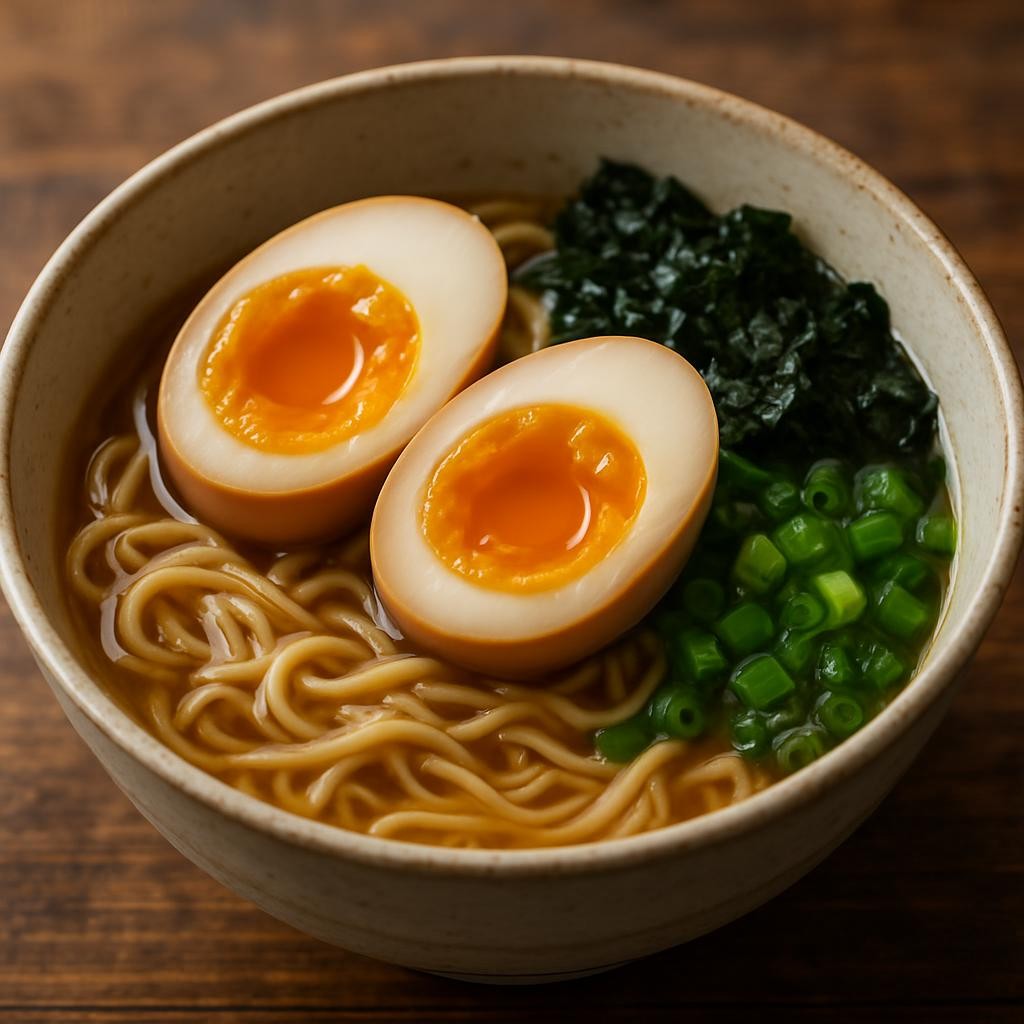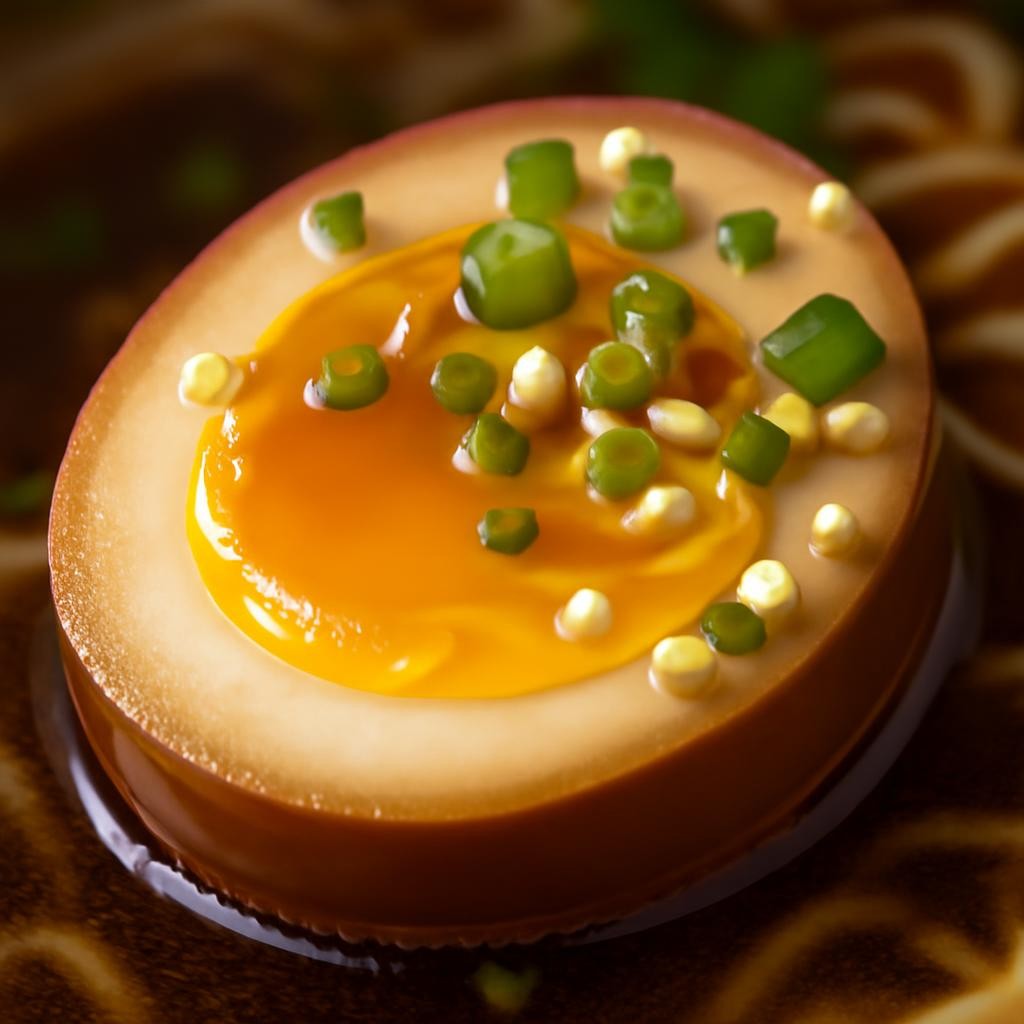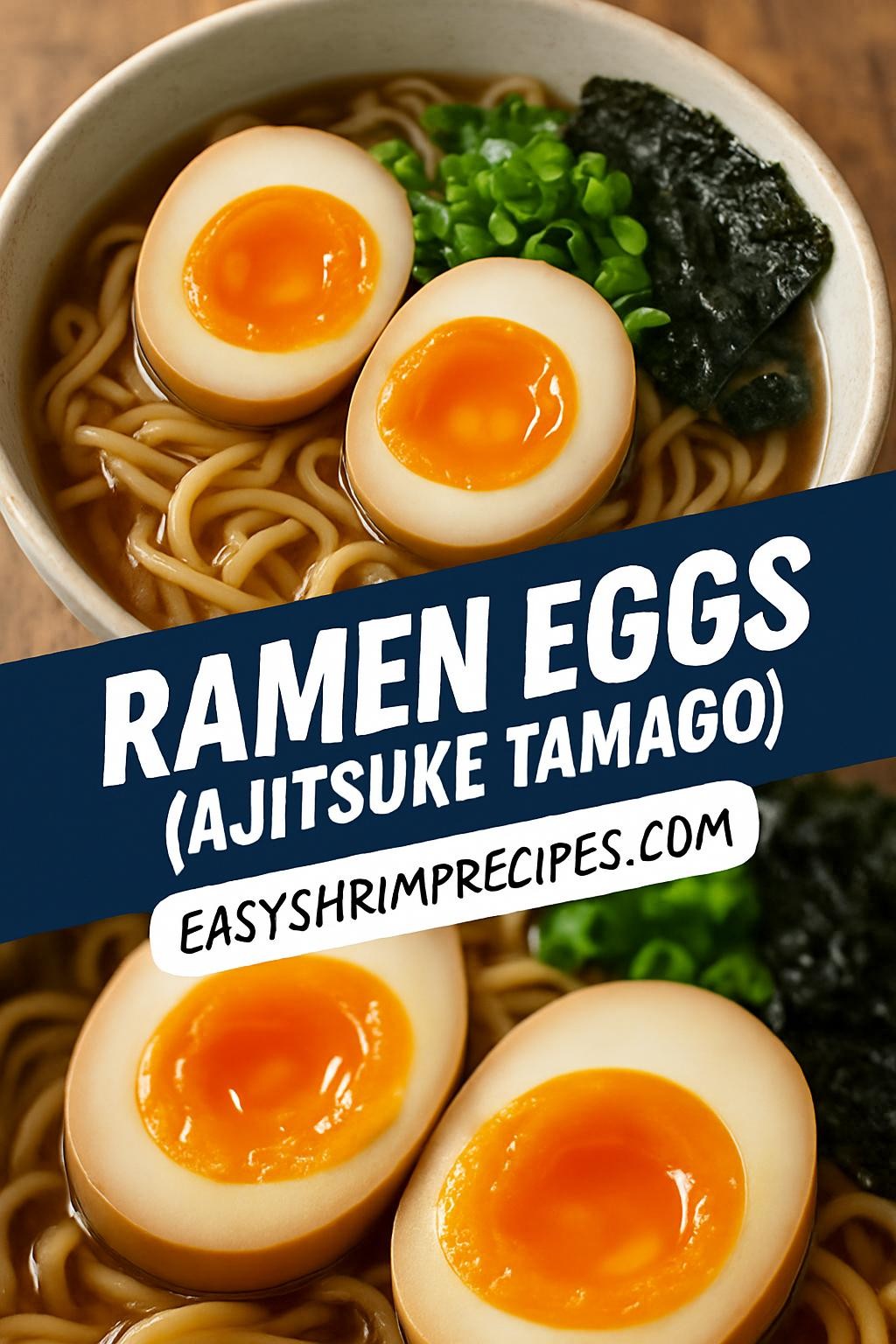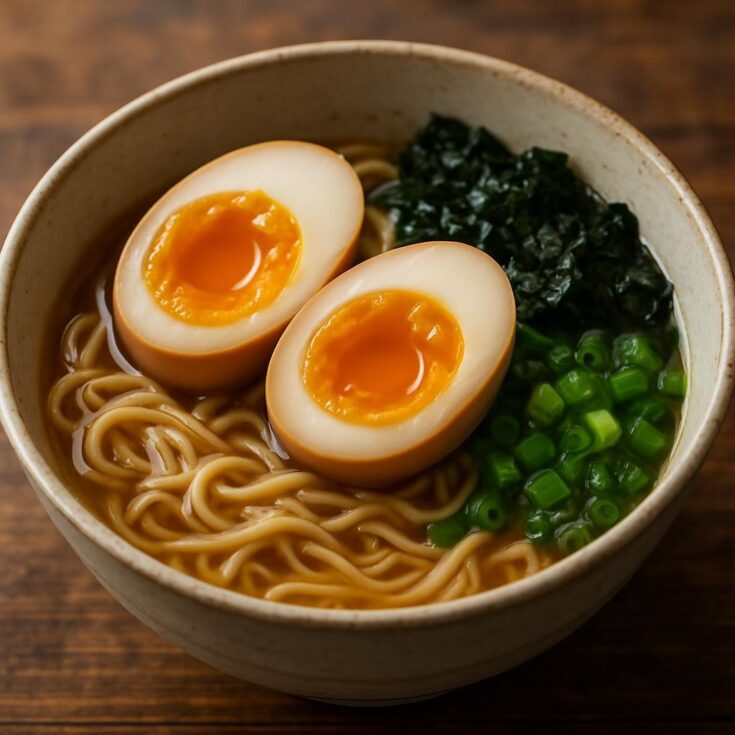Ramen Eggs, or Ajitsuke Tamago, are a delightful addition to any bowl of ramen, elevating your meal with their rich, savory flavor and creamy yolk. These marinated soft-boiled eggs are a culinary staple in Japanese cuisine, adored for their umami-packed taste and appealing texture. Perfectly cooked, with a slightly runny yolk and a savory marinade, Ramen Eggs marry beautifully with the noodles, broth, and toppings of your favorite ramen dish.

Why You Will Love This Recipe
You’ll love this recipe for Ramen Eggs not only for their addictive flavor but also for their simplicity. The slight sweetness and umami from the marinade make these eggs a versatile ingredient that can enhance not just ramen but also salads, rice bowls, and more. Cooking them is a breeze, taking only a few minutes of boiling followed by a relaxing marination period. Plus, they fit seamlessly into almost any diet, providing a protein-packed option that’s gluten-free and incredibly satisfying.
Tips and Tricks
To achieve the perfect Ramen Eggs, follow these tips. Use fresh, high-quality eggs for the best flavor and texture. Make sure to prepare an ice bath before boiling the eggs to stop the cooking process instantly and help achieve that perfect soft-boiled center. For a more flavorful marinade, allow the eggs to soak overnight. If you’re short on time, even a couple of hours will impart a delicious taste. Experiment with the marinade – adding a splash of mirin or a hint of chili can elevate the flavor profile.
Make Ahead Tips
Ramen Eggs are excellent for meal prep! You can boil and marinate the eggs a day or two in advance, storing them in the fridge until you’re ready to enjoy them. The longer they marinate, the more flavorful they become. If you’re making ramen for a busy weeknight, these eggs can be a perfect make-ahead component, saving you time without compromising taste.

Recipe Variations
Feel free to adjust the marinade to suit your taste! You can replace soy sauce with tamari for a gluten-free option or use coconut aminos for a lighter, sweeter flavor. For a spicy kick, add sriracha or chili oil to the marinade. If you’re looking for a different twist, try using miso paste for an umami-rich variation. Lastly, you can experiment with adding garlic or ginger to the marinade for a more complex flavor.
How to Serve
Serve your Ramen Eggs cut in half atop a steaming bowl of ramen, allowing the yolk to ooze into the broth for added richness. Garnish with sliced green onions, sesame seeds, and a sprinkle of nori for a beautiful presentation. Pair with a side of pickled vegetables for a colorful plate. The contrast of colors and textures will not only please the eye but also enhance the overall dining experience.

Pairing Suggestions
For drink pairings, consider a chilled sake or a light Japanese beer to complement the flavors of the ramen. If you’re looking for a non-alcoholic option, a refreshing iced green tea would be perfect. As for side dishes, serve with gyoza or a crisp Asian slaw to add crunch and balance to your meal. For dessert, a light matcha green tea ice cream could be a delightful finish.
How to Store
Store leftover Ramen Eggs in an airtight container in the refrigerator for up to three days. Avoid freezing them, as the texture may suffer. When ready to use, simply remove from the fridge and add directly to your ramen or any dish you’re preparing. If you prefer them warm, briefly soak them in hot water for a few minutes before serving.
Equipment Needed
You will need a medium saucepan for boiling the eggs, a bowl for the ice bath, and a measuring cup for mixing the marinade. A whisk can be handy for combining the marinade ingredients. If you don’t have a whisk, a fork will work just fine. No special equipment is necessary, making this recipe accessible to everyone.

Dietary Adaptations
For a vegan version, substitute eggs with silken tofu, marinating it in the same soy sauce mixture for a similarly flavorful experience. To make the recipe dairy-free, simply avoid any dairy-based ingredients in your ramen. For nut-free adaptations, check the labels on your soy sauce and other ingredients, as some brands may contain traces of nuts.
Seasonal Adaptations
In spring, try adding fresh herbs like chives or cilantro to your marinade for a fresh twist. In summer, consider incorporating citrus zest, such as lime or yuzu, to brighten the flavor. Fall and winter may call for heartier additions like garlic or shallots to the marinade, enhancing the warm, cozy feel of your ramen bowl.
Recipe FAQs
- Can I use brown eggs instead of white? Yes, both types of eggs can be used, but the flavor and texture will remain the same.
- What if I don’t have mirin? You can substitute with a mixture of sugar and water or simply omit it, adjusting the soy sauce for taste.
- How long should I marinate the eggs? Ideally, marinate for at least 4 hours, but overnight is best for maximum flavor.
- How do I know when the eggs are perfectly boiled? For a soft-boiled egg, aim for 6 to 7 minutes of cooking time, then plunge into ice water immediately.
How To Make Ramen Eggs (Ajitsuke Tamago)
Ramen Eggs (Ajitsuke Tamago)

Ramen Eggs, or Ajitsuke Tamago, are a delightful addition to any bowl of ramen, elevating your meal with their rich, savory flavor and creamy yolk.
Ingredients
- 4 large eggs
- 1/2 cup soy sauce
- 1/4 cup mirin (or substitute)
- 1 tablespoon sugar
- 1/2 cup water
- Optional: sliced green onions and sesame seeds for garnish
Instructions
- Begin by boiling water in a medium saucepan. Once boiling, gently lower the eggs into the pot using a slotted spoon.
- Boil the eggs for 6-7 minutes for a soft yolk, adjusting the time if you prefer a firmer yolk.
- While the eggs are boiling, prepare an ice bath in a bowl filled with cold water and ice.
- Once the time is up, immediately transfer the eggs to the ice bath to halt the cooking process. Let them cool for about 5-10 minutes.
- In a separate bowl, mix together the soy sauce, mirin, sugar, and water until the sugar dissolves.
- Carefully peel the cooled eggs and place them in the marinade. Ensure they are fully submerged.
- Marinate in the fridge for at least 4 hours, or overnight for best flavor.
- When ready to serve, slice the eggs in half and garnish with green onions and sesame seeds.
Nutrition Information
Yield
4Serving Size
1Amount Per Serving Calories 178Total Fat 8gSaturated Fat 2gTrans Fat 0gUnsaturated Fat 6gCholesterol 186mgSodium 1825mgCarbohydrates 14gFiber 1gSugar 10gProtein 10g
Easy Shrimp Recipes.com, occasionally offers nutritional information for recipes contained on this site. This information is provided as a courtesy and is an estimate only. This information comes from online calculators. Although allchickenrecipes.com attempts to provide accurate nutritional information, these figures are only estimates.
Final Thoughts
Making Ramen Eggs is a simple yet rewarding endeavor that enhances your ramen experience significantly. With just a few ingredients and a little patience, you can create a delicious topping that will impress family and friends alike. Whether enjoyed in a comforting bowl of ramen or as a snack on their own, these flavorful eggs are bound to become a favorite in your kitchen. Happy cooking!

